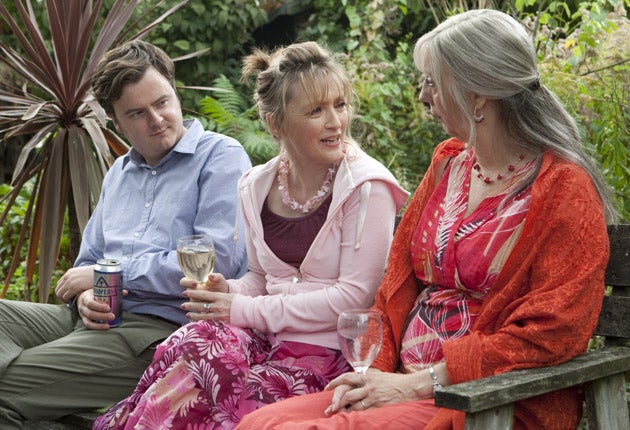Another Year, Mike Leigh, 129 mins (12A)
Bitterly witty, his film about ageing is compelling

It's easy to stereotype Mike Leigh's films as all talk, talk, talk, punctuated by occasional cups of tea.
But in Another Year, it's the quiet that counts. His new film ends on a scene of breezy dinner-table chatter, but the cheerful ambience fades to absolute silence over a close-up of a central character as she gazes haggard-eyed, seemingly mulling over what her life has been and what it has failed to be.
There's an equally telling silence at the start, as the film opens on a peripheral figure played by Imelda Staunton – a woman suffering from insomnia. Her doctor (Michele Austin) coaxes her to discuss what's really troubling her, but the woman tersely refuses to address the roots of a possibly incurable sorrow. In this story, whether people clam up or can't stop gabbing, their grief will show, however much they'd prefer to hide it.
Another Year is an ensemble piece, which is hardly new for Mike Leigh. What is striking, however, is quite how decentred the film is. It depicts several characters over the seasons of a single year, as if in four acts – and the real events, the real changes, pretty much take place offstage between the acts.
The central characters are friends in late middle age. Medical counsellor Gerri (Ruth Sheen) and her geologist husband Tom (Jim Broadbent) met when they were students. Made for each other (Tom and Gerri, see?), they're thoroughly adept at the art of domestic happiness – unlike Gerri's colleague Mary (Lesley Manville). In spring, Mary visits the couple, gets drunk and over-splurges – as, it seems, she does habitually – about her life's romantic disappointments. In summer, Tom and Gerri welcome their old friend Ken (Peter Wight), another bitterly frustrated boozer. The couple serve lunch in the garden, and Mary flirts inappropriately with her friends' 30-year-old son Joe (Oliver Maltman), apparently with his encouragement.
Then in autumn, Joe brings home his new girlfriend (Karina Fernandez), to Mary's very visible displeasure. Come winter, a death in the family takes us to Derby to meet Tom's brother Ronnie (David Bradley), a haggard pillar of blasted lugubriousness, and his son Carl (Martin Savage), a man bristling with ill-repressed fury.
The film's four periods, you'll note, go up to winter, with no reassuring cyclical return of spring. Leigh's principal characters end up facing the winter of their lives – though some have distinctly better springs and summers to look back on than others. You could say this is a film about haves and have nots – some have the knack of living, others tragically don't.
A nightmare friend-in-need, Mary would test anyone's patience – a would-be bird of paradise whose gaudy feathers conceal a shell-shocked chicken. But often in Leigh's films, the most rebarbative characters are redeemed dramatically by the energy they radiate even in despair. Manville's Mary positively crackles, an isotope of nervous anxiety and delusion, and declares with skin-deep brio: "I'm really comfortable about where I am in my life!" In reality, she's not even comfortable in her own car – a vehicle that provides a pitiless running joke. Meanwhile, Tom and Gerri's thoroughgoing niceness remains for us to make up our own minds about. They're perfectly affable, level-headed, manifestly good – and yet, Leigh's cutaways to Broadbent's and Sheen's pursed-lip glances imply a colder, more judgemental duo than the warmth initially suggests.
For all its undemonstrative realism, there are bold tones of expressionism to Another Year. They're present in the broader strokes of some of the acting – in the protective personae that Mary and Ken have created for themselves – and in the look of the winter section, where all warmth and colour are bled out of the visuals as the film contemplates death, loneliness and life's unhealed wounds.
Anyone sceptical about the Leigh method of giving his characters complete pasts – not always visible on screen – will see the approach vindicated here more than ever. These people manifestly carry the weight of their pasts, even in the small details. For example, it absolutely makes sense that Tom and Gerri went to the 1968 Isle of Wight rock festival and saw a band called Plastic Penny. (I Googled them: they existed.) The characters carry such weight partly because the actors do – some, including a briefly seen Phil Davis, have worked with Leigh for more than 30 years. As a result, Another Year feels more communally lived-in than any of his films. Conversely, the film is also effective when we're told little about people. Actor Martin Savage no doubt knows exactly why Carl is so severely damaged – but we're left to imagine for ourselves, and that mystery is hugely resonant.
I suspect that the older you are, the more Another Year will strike a chord with you. You may pick up more nuances the more you've weathered the disappointments of love and age, learned to make compromises, come to know yourself (or not) over the years. Not that you have to be 40-plus to appreciate this richly philosophical, superbly acted piece; let's just say it's not for the Scott Pilgrim market. There is a powerful charge of thought, experience and bitter wit here, and what makes it resound so tellingly is the sense of time – Leigh's single year is like a section of tree trunk in which the rings tell the story of an entire past.
Next Week:
John Walsh samples chills con carne in the Mexican cannibal film We Are What We Are
Join our commenting forum
Join thought-provoking conversations, follow other Independent readers and see their replies
Comments
Bookmark popover
Removed from bookmarks